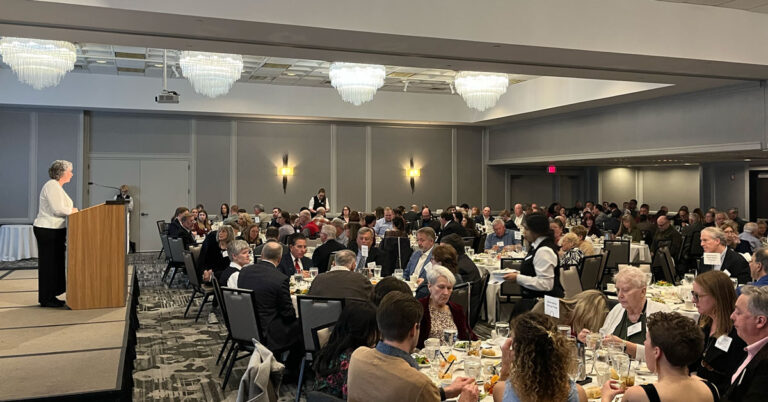AP Stylebook announced several AP Style changes Friday, April 27, at the annual American Copy Editors Society conference in Chicago.
They include:
survivor, victim
Use these terms with care because they can be imprecise and politically and legally fraught.
Survivor can denote someone who has lived through an injury or disease, but also can apply to someone who endured a threat but escaped injury altogether. Example: a mass shooting survivor. Likewise, victim can create confusion because it can variously mean someone killed, injured or subjected to mistreatment such as sexual misconduct.
Be specific if there is room for confusion: The ceremony honored people wounded in the mass shooting, not The ceremony honored victims and/or survivors of the mass shooting. The play told the story of those killed in the hurricane, not The play told the stories of the hurricane’s victims.
Also be alert to potential biases and assumptions inherent in the word victim. A phrase such as AIDS victim, for instance, not only makes it unclear whether the subject is alive or dead, but many AIDS patients do not consider themselves victims. Instead, use neutral, precise descriptions: He has AIDS. She has hepatitis. In crime stories, avoid alleged victim if possible; it is too easily construed as skepticism. In stories in which sexual misconduct or other allegations are leveled, consider calling the person making the allegations an accuser instead of a victim if shorthand is needed, to avoid implications of guilt on the part of the accused.
Survivor is often used to describe people who have lived through physical or emotional trauma, as in abuse or rape survivor. It is best to be specific when referring to individuals, especially if the person was never in danger of death. Use of survivor gets more latitude when describing groups. A group of Holocaust survivors met at the memorial.
sexual harassment, sexual misconduct
These are broad terms that can cover a wide variety of actions or behavior. In stories, be as specific as possible in describing the kinds of behavior that is being alleged or admitted – such as groping, unwanted kissing, disrobing, or verbal or physical abuse or assault.
If a shorter term is needed, for example in a headline, AP uses the generalized description sexual misconduct, rather than sexual harassment, because it encompasses a broader range of sexual misbehavior and does not run the risk of diminishing some of the alleged acts.
As with all accusations, these allegations should be well-documented and corroborated in some way, including an effort to get comment from the accused individuals or their representatives.
Granting anonymity to accusers should follow AP’s strict guidelines on the use of anonymity.
immigration
In the immigration entry, guidance was expanded and revised on the term “Dreamer” and added guidance on the term “chain migration” to reflect the following:
DREAM Act, “Dreamers” The DREAM Act – Development, Relief and Education for Alien Minors – is congressional legislation that would allow young immigrants in the country illegally who were brought here as children to remain in the country if they meet certain criteria. The legislation has never been approved by Congress as of March 1, 2018. It is similar to but not the same as the Deferred Action for Childhood Arrivals program. Many refer to immigrants who would benefit from either the DREAM Act or DACA as “Dreamers.” The term “Dreamers” is acceptable if necessary, but should be used sparingly and in quotation marks in all references. Explain the term soon after use: They are commonly referred to as “Dreamers,” based on never-passed proposals in Congress called the DREAM Act. For balance, also include wording such as: Opponents say the law rewards people for breaking the law, encourages illegal immigration and hurts American workers. Often it is possible in subsequent references to use other terms such as immigrant, youths or a person’s name instead of “Dreamer” or “Dreamers.”
“chain migration” A term applied by immigration hardliners to what the U.S. government calls family-based immigration, a longstanding program granting preference to people with relatives who already have legal residency or U.S. citizenship. Avoid the term except when used in a quotation, and explain it.
lists, bulleted lists
(new entry combining bits of other entries and allowing the “Our partners are:” construction) AP uses dashes instead of bullets to introduce individual sections of a list; others may choose to use bullets. Put a space between the dash or bullet and the first word of each item in the list. Capitalize the first word following the dash or bullet. Use periods, not semicolons, at the end of each section, whether it is a full sentence or a phrase.
Use parallel construction for each item in a list:
– Start with the same part of speech for each item (in this example, a verb).
– Use the same voice (active or passive) for each item.
– Use the same verb tense for each item.
– Use the same sentence type (statement, question, exclamation) for each item.
– Use just a phrase for each item, if desired.
Introduce the list with a short phrase or sentence: Our partners: or These are our partners: or Our partners are:
political parties and philosophies
Guidance was added to avoid progressive, which can imply improvement, as a political descriptor except in quotes or the names of organizations or political parties.
today, tonight and time elements
Changes were made allowing today and tonight in uses other than in news stories. They include:
Use the day of the week, not today or tonight, in news stories. In news stories, use today or tonight only in direct quotations, and in phrases that do not refer to a specific day: Customs today are different from those of a century ago.
In other types of writing, today, this morning, this afternoon and tonight are acceptable if using the day of the week would be awkward. For example, in an internal note Wednesday to company staff: Xin Chen took over as vice president for human resources today. In an external announcement: Xin Chen took over as vice president for human resources Wednesday.
Eskimo (adds that some consider the term offensive)
In general, avoid the term Eskimo for the native peoples of northern North America except when paired with a group’s ethnic name in Alaska: Inupiat Eskimos, a Yup’ik Eskimo community, a Cu’pik Eskimo, etc. Follow the preference of those involved in the story, such as identifying someone simply as Yup’ik. The term Eskimo was assigned by non-native people and in some cultures, has since taken on offensive connotations. The term Inuit is used in Canada, Greenland and by some groups in northern Alaska.
Aborigine (adds that some consider the term offensive)
An outdated term referring to aboriginal people in Australia. It is considered offensive by some and should be avoided.
chronic traumatic encephalopathy (revised)
A degenerative brain disease that researchers have linked to concussions or repeated blows to the head. It is most closely associated with football but also has been diagnosed in some athletes from other contact sports and military combat veterans. It can be identified only posthumously through an examination of the brain. CTE is acceptable on second reference, and in headlines if essential.
Western Wall
The last remaining part of the second Biblical temple and the holiest site where Jews can pray. The Western Wall is located in Jerusalem’s Old City, on the edge of the site known as the Temple Mount to Jews and Haram al-Sharif (the Noble Sanctuary) to Muslims. Some non-Jews refer to the site as the Wailing Wall.
BASE jumping
Acceptable on first reference for the extreme sport, but explain later in the story. BASE is an acronym for building, antenna, span (such as a bridge) and earth (such as a cliff).
HIPAA
Where possible avoid using the term, which is an acronym for the Health Insurance Portability and Accountability Act of 1996. Instead refer to privacy laws or the federal law restricting release of medical information. If HIPAA is used in a quote, explain it.
coworking (n., adj.)
Sharing workspace and amenities, such as Wi-Fi, a printer, fax machine and the like, when people don’t actually work for the same company but instead are self-employed or remote workers. No hyphen for this use. But: co-worker for a colleague within the same company.
storm names (new section as part of the weather terms entry)
Major storm names provided by government weather agencies, the European Union or the World Meteorological Organization are acceptable. Do not use names created by private weather agencies or other organizations.
fire names
Use descriptors to identify a fire. For example: the deadly fire burning near San Diego. While local media may choose to use the names of fires given by local agencies, the AP generally does not use those names because they are not widely known to a global audience. On some occasions, when a fire is particularly significant, the AP may use the name of the fire lower in the story
roundtable (n. or adj.), round table (n.), Round Table (n.)
The Knights of the Round Table will hold a roundtable discussion after seating themselves at a round table. They likely will refer to their meeting as a roundtable.
numerals
Revision to reflect that a numeral-and-letter combination may start a sentence: 3D movies are drawing more fans. That joins starting a sentence with the year as the only times when a numeral is OK at the beginning of a sentence.
rock ’n’ roll
But Rock & Roll Hall of Fame (changing the and to &)
Internet service provider
ISP is acceptable on second reference.
S&P 500
Use in all references for what was formerly known as the Standard & Poor’s 500 index. It is the market indicator most professional investors use to determine how stocks are performing. It encompasses 500 top companies in leading U.S. industries. Many mutual funds use it as the benchmark they measure their own performance against.
Walmart Inc.
The world’s largest retailer. It changed its legal name from Wal-Mart Stores Inc. in 2018. Headquarters is in Bentonville, Arkansas.
collide, collision
AP Stylebook dropped the previous rule that two objects must be in motion before they can collide. The entry has been deleted.
breastfeed, breastfeeding, breastfed
Also:
- 3D now has no hyphen.
- Homepage is one word.
- Smartwatch is one word (added to the smartphone entry).
- Timeshare is one word.
- AR is acceptable on second reference for augmented reality.




